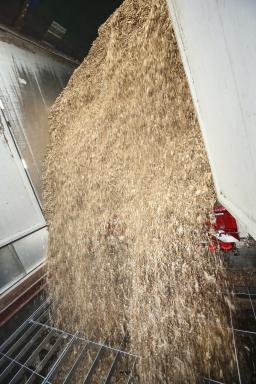Getting the facts straight

Here at Rural Energy we believe that biomass is a fantastic technology capable of providing dependable and sustainable heat and power across the UK. We have however come across misconceptions of the technology causing people to discount biomass when it could have been a viable option for them. We decided we should get the facts straight and bust the common biomass myths once and for all.
MYTH 1: It is expensive
Admittedly, the capital cost of biomass compared to traditional oil or gas boilers, is initially higher and poor system design, installation and sub-standard maintenance can further increase lifecycle costs. However, this will be balanced by energy cost savings when the system is running efficiently and by taking into account any Renewable Heat Incentive (RHI) benefits. In addition, fuel efficiency can be maximised if you follow manufacturers’ recommendations.
MYTH 2: It is unreliable
Biomass is only unreliable if weekly checks and sensible servicing routines are ignored. As a minimum every biomass system should have an annual and a 6-month interim service (for heavy duty applications) as these will have massive implications for system lifespans, breakdown frequency and running efficiencies.
MYTH 3: It takes up a lot of space
The space required depends on chosen fuel type, boiler requirements (calculated through heat load and fuel quality), any price or construction restrictions, location of the storage and distance from the boiler, and existing space on site. It is not always necessary for biomass boilers to have large fuel stores, for example, if using a pellet fuel boiler, standalone silos or day hoppers can be used, biomass fuel stores can be underground if feeding the boiler via auger type arrangements or vacuum suction systems. If none of these prove suitable, Rural Energy can provide a package plant room that is housed separately from the main building.
MYTH 4: Burning fuel releases carbon so it is not really a ‘green’ solution
Contrary to popular opinion, wood burning is not a carbon neutral activity but compared to other burning activities, wood, with careful and considerate management, is clearly a much more sustainable resource than fossil fuels. What is more, the processing and transportation required in the wood fuel supply chain uses minimal energy (typically no more than 2%) meaning at the point at which it is finally consumed it remains well above an 80% saving on green house gases over fossil fuel, often even over 90%.
MYTH 5: All wood fuel is the same
No it isn’t! Most biomass boilers run on wood chip, wood pellets, logs or briquettes. Others are designed to burn straw and hay bales, waste wood and shavings from manufacturing processes. Whatever your preferred choice, biomass boilers work most efficiently when the appropriate wood fuel is used, in accordance with the manufacturer’s guidelines.
For a more in depth response to the five most common biomass myths, check out our blog on Installer magazine
- Agriculture (10)
- Awards (5)
- Carbon Reduction (26)
- Commercial (13)
- Country Estates (4)
- CSR (3)
- Design (4)
- District Heating (2)
- Domestic (2)
- Education & Healthcare (2)
- Events (11)
- Finance (3)
- Herz (9)
- Horticulture (3)
- Industrial (6)
- Installer Network (1)
- Poultry (4)
- Project Management (1)
- Public Sector (1)
- Renewable Heat Incentive (23)
- Service & Maintenance (3)
- Training (2)
- Warehouse (1)
- Wood Fuel (13)
- March 2018 (1)
- February 2018 (1)
- January 2018 (1)
- September 2017 (2)
- May 2016 (1)
- March 2016 (1)
- February 2016 (1)
- January 2016 (3)
- December 2015 (2)
- November 2015 (1)
- October 2015 (2)
- August 2015 (2)
- July 2015 (1)
- May 2015 (2)
- April 2015 (1)
- March 2015 (2)
- February 2015 (1)
- January 2015 (1)
- December 2014 (2)
- November 2014 (1)
- October 2014 (1)
- August 2014 (2)
- July 2014 (2)
- June 2014 (1)
- May 2014 (1)
- April 2014 (3)
- March 2014 (1)
- February 2014 (1)
- January 2014 (1)
- December 2013 (1)



